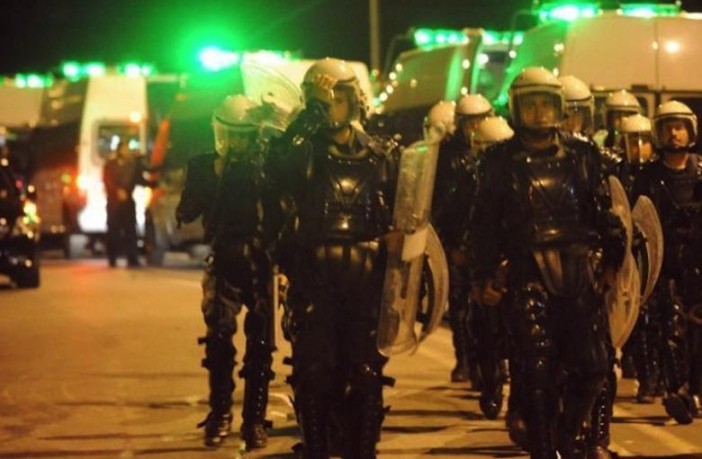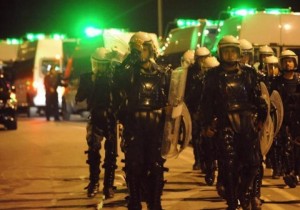Al Akhbar
By Rime El Jadidi
Moroccan authorities launched a preventive security policy that includes stationing military patrols in large cities to “fight the various threats facing the Kingdom.” The government has indicated that its main concern is the involvement of over 2,000 Moroccans in terrorist groups abroad and the implication of their return to the country. However, will a security campaign, on its own, be able to ward off attacks against the Kingdom?
On Monday, October 27, 2014, the citizens of Casablanca woke up to a very unusual scene: the presence of military men in their city. Teams of three – two military men and a civilian police officer – had been stationed near downtown Casablanca’s strategic sites, each wearing an armband with the word “Hadar” (Arabic for “Vigilance”) inscribed on it.
Their presence is part of the “Hadar” campaign launched by the Ministry of Interior to combat what it says are the various threats facing the Kingdom, and to ensure “the security of citizens and foreign visitors.” Hadar teams are now present near the central sites in all large cities, as well as at airports and train stations.
The Ministry of Interior first implemented the “Hadar” plan at Mohammed V Airport, on October 25, before extending it to the cities of Rabat and Casablanca at the end of the month. Now it is being implemented in other large cities such as Marrakech, Fès, Agadir, and Tangier. The aim of this security policy is to “reassure Moroccan citizens as well as foreigners,” Moroccan Minister of Interior Mohammed Hassad said during a press conference on October 29. The security plan involves several security departments, both military and civilian.
“I’ve noticed an intensified police presence since the summer, so I wasn’t surprised. It’s true that it’s an uncommon scene here in Casablanca, but we know it’s meant for our protection,” Walid, a 21-year-old engineering student, told Al-Akhbar English.
Alexandra, a French expatriate, doesn’t share Walid’s opinion: “In general, I don’t like seeing military men in the streets because I find it oppressive. So, I don’t feel safer when I see them. In fact, it makes me worry that there might be a threat, even though I don’t feel it myself.” Alexandra has been living in Casablanca for the last couple of years. She first saw Hadar teams at Mohammed V Airport. “I was really surprised because I’ve never seen the military at the airports in Morocco,” she recalled. “I wasn’t worried then, but I was wondering what was going on because it’s unusual.”
Is Morocco at risk?
[W]hat is striking about this plan is “the limited number of sites where the Hadar teams operate… These tend to be public areas in specific cities rather than everywhere. It is a careful and limited operation.” – Jack Kalpakian, International Relations professor. Military presence in cities is not peculiar to Morocco, according to Jack Kalpakian, professor of International Relations at Al-Akhawayn University in Ifrane, but what is striking about this plan is “the limited number of sites where the Hadar teams operate… These tend to be public areas in specific cities rather than everywhere. It is a careful and limited operation.” The operation has three goals, according to the professor. First, to “send a message to the citizenry that the state is present and is carrying out its protective security role.” Secondly, to show AQAM [al-Qaeda and Associated Movements] and ISIS that “the state is willing to shoot back and fight.” And finally, to “have an immediate, local response to an attack on sensitive sites.”
For Professor Kalpakian, the fact that there are mixed teams of military and civilian police officers means that “the armed forces are acting under the guidance of civilians, and that is a positive thing. Hadar teams always include a civilian police officer; they are the person responsible and the one directing the accompanying Royal Army personnel, whose expertise is weapons use and not civilian law enforcement.”
According to Morocco’s Minister of the Interior Mohammed Hassad, the country is not directly targeted by any terrorist group, but the general threat addressed to a number of states in the region motivated these precautionary measures, notably after Morocco joined the anti-ISIS coalition.
“From the July speech of the Interior Minister in Parliament, it is crystal clear that Morocco is cooperating with many other countries intelligence services, receiving and providing information about Moroccans fighting for Daesh [ISIS],” Professor Kalpakian explained. “There are more immediate threats to Morocco than Daesh, particularly the jihadists in Northern Nigeria, Mali, and parts of Mauritania, so I doubt that there would be involvement beyond intelligence and law enforcement, at this stage. That being said, these two aspects are often the most valuable pieces of the counter terrorism puzzle. ”
Morocco’s involvement in the anti-ISIS coalition doesn’t necessarily increase the threat to the Kingdom, according to Kalpakian. “Morocco is at risk whether or not it participates in the anti-Daesh coalition,” he added. “Daesh has been exterminating and destroying not only Christians, Shiites, Shabaks and Yezidis, but Sunni Muslims who live under traditional arrangements, like tribes, or who practice folk and Sufi interpretations of Islam. Participating or not participating in the anti-Daesh coalition will not reduce the threat to Morocco, and given the access to information that participation provides, it is the safer alternative.”
Bolstering a legal response to terrorism
Another major concern for Morocco is the important number of Moroccans involved in terrorist organizations abroad, namely in Syria and Iraq. In recent months, the authorities have reported to have dismantled several terrorist cells throughout the country. The government has also buttressed its legal response to terrorism. On September 18, the government approved an amendment to the Penal Code, expanding the power of courthouses to deal with terror cases. This amendment aims to prevent the recruitment of Moroccans to terrorist training camps outside of the country.
It enables the “prosecution and trial of any Moroccan within the country or abroad, as well as any foreigner within the national territory, for terrorist crimes perpetrated outside the Kingdom.” According to Minister of Justice Mustapha Ramid, these amendments to the Penal Code are justified by the need to counter “the offensive propaganda targeting young Moroccans in order to recruit them to join hotbeds of tension in the name of jihad.”
“[O]peration Hadar has many Moroccans expressing concern about the return of a sort of surveillance state that existed during the long rule of Mohammed VI’s father, Hassan II.” – Vish Sakthivel, doctoral candidate Jack Kalpakian thinks Morocco’s best option is “actually a very simple one — rehabilitation and re-education.” The country’s law enforcement authorities need to know who these people are and should set up a program to reintegrate them into society, along with their prison sentences. There are many such programs around the world, including programs in Denmark and Saudi Arabia, which have much to offer in terms of orientation points. Such programs should provide marketable skills, PTSD treatment, and religious re-education — with an emphasis on de-takfirization, the proper relations between religious communities, and encounters with former terrorists who have renounced violence.”
However, Vish Sakthivel, a doctoral candidate at the University of Oxford, writing for the World Politics Review, indicates that, “[O]peration Hadar has many Moroccans expressing concern about the return of a sort of surveillance state that existed during the long rule of Mohammed VI’s father, Hassan II.” Sakthivel points that it is the failure to “address the fundamental economic and social climate that has driven thousands of young men to ship off to fight in Iraq and Syria.”
So while the Moroccan authorities claim that over 1,000 Moroccans are fighting for ISIS, in addition to almost another 2,000 bi-nationals, and that the Hadar campaign aims to counter terrorist attacks or threats, it remains to be seen whether this security policy will be used to target political dissidents.
Rime El Jadidi is a Moroccan journalist and filmmaker. Her work can be viewed at: http://rimeeljadidi.contently.com/








